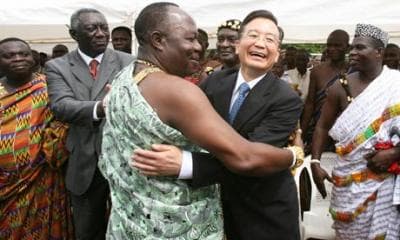
For centuries, Africa was considered a dark interlude between the grandeur of Europe and the emerging markets of Asia and often associated with corruption, war, and injustice. However, to the Chinese, Africa is the secret ingredient in their recipe for rapid economic growth.
SEE ALSO: Malians Save Hundreds of Thousands of Ancient Timbuktu Manuscripts in the Face of Terrorists
The United States Congress House Committee on Foreign Affairs must take lessons from the Chinese economic emergence in Africa or risk the political and economic demise of the United States in the continent.
In addition, economic declines in African countries may lead to increased Chinese political influence, large market share, and American companies losing the competitive edge they’ve enjoyed for decades in Africa.
The impact of these ramifications will affect average Americans because gas price will increase as a result of less imports from resource-rich African countries, such as Nigeria that accounts for 5 percent of U.S daily imports (EIA, 2012).
Unemployment rates may also increase if African countries decide to import more goods from China, thus displacing the last frontier of American manufacturing in swing states, such as Iowa, Michigan, and Ohio.
China’s successful business relations in Africa have mystified the United States.
“Bilateral trade amongst the two regions multiplied fifty-fold from 1980 to 2005, quintupling between 2000 and 2006 from $10 billion to $55 billion dollars.” (Michel & Beuret, 2008).
The nineties saw rapid advancements in trade relations, which were further facilitated by the Forum on China-African Cooperation (FOCAC).
According to the official website, FOCAC serves as “a platform established by China and friendly African countries for collective consultation, dialogue, equality, effectiveness, mutual benefit, and common development” (FOCAC, 2009).
Since its inception in 2000, bilateral trade relations between the two regions have multiplied almost 16 fold; trade totaled one hundred and sixty (160) billion USD in 2011 compared to ten (10) billion in 2000 (Wang, 2012).
Today, China is Africa’s largest trade partner.
By contrast, in the first quarter of 2013, the United States’ total trade (exports and imports) with sub-Saharan Africa only reached $16.47 billion, a decrease of 24 percent compared to the same period in 2012 (International Trade Administration, 2013).
Evidently, trade relations between the African continent and the United States are weakened.
Partisan politics in Congress contributes to America’s demise in Africa, because Congress has failed to pass comprehensive economic legislation since the African Growth Opportunity Act (AGOA) led by the Clinton administration in 2000.
Africa also has emerged as Beijing’s top investment destination, with more than 2,000 Chinese enterprises investing in the continent and accumulating investments surpassing $40 billion (Wang &Wei, 2012).
The Chinese economic engagement in Africa brings forth a unique opportunity for the United States to learn how to participate in the growing trade opportunities eminent in Africa and not perpetuate the conventional wisdom of Africa as a poster child of aid and poverty.
The United States must balance aid and business relations with Africa because it’s losing to China on both sides of the spectrum.
Even though U. S. President Barack Obama’s recent visits led to more than $100 million in additional funding for African countries, China’s development assistance averaged more than $30 billion annually during the past half-decade (Mailafia, 2013).
To regain America’s competitive advantage in Africa, the U.S Congress House Committee on Foreign Affairs must help highlight the importance of Africa to the United States.
The President in partnership with the committee must introduce solution-oriented policies based on solid business partnerships and long-term- oriented relationships with African countries.
Business Partnerships
The perception of a mutual investor should be portrayed and put into practice to earn the trust of African countries.
The amount of aid allocated to Africa should be reduced and diversified into FDI, zero-interest loans, infrastructural development, agriculture, and education.
Long-Term Orientation
Africa’s growth is still at a stage of infancy; hence, policies put in place should be of long- term focus.
In order to instill a long-term solution, U.S policy must find ways to help the citizens of African countries develop their own self-sustaining industries.
There is a Chinese saying, “Give a man a fish, you have fed him for today. Teach a man to fish, and you have fed him for a lifetime.”
Implicit here is a warning: if Congress refuses to pass legislation based on these lessons of the Chinese emergence in Africa, the United States may eventually relinquish its world dominance to China.
References
Bräutigam, D. (2011). China is successful in Africa where NGOs are not – providing infrastructure. Retrieved June 13, 2013 from http://www.
China-Nigeria trade ties continue to strengthen. (2009). Retrieved June 13 2013, from
EIA (2012) Today in Energy: U.S. imports of Nigerian crude oil have continued to decline in 2012 Retrieved September 20, from http://www.eia.gov/
FOCAC (2009). Beijing Declaration of the Forum on China-Africa Cooperation. Retrieved from June 13, 2013 http://www.fmprc.gov.cn/zflt/
http://english.peopledaily.
January-March 2013. Retrieved September 23, from
http://trade.gov/agoa/pdf/Jan-
Mailafia, O. (2013) China,AfricaandtheWest.
Michel, S. & Beuret, M. (2009). China Safari; On the Trail of Beijing’s Expansion in Africa. France: a China-afrique
Wang, C., & Wei, J. (Wang Chenxi, Wei Jianhua). China-Africa friendship enhanced by diverse, growing cooperation. Retrieved June 13 2013, from http://news.xinhuanet.com/
Wang, Y. (2012). China committed to helping build Africa’s self-‐development capability: Official. Retrieved June 12, 2013, from http://news.xinhuanet.com/









